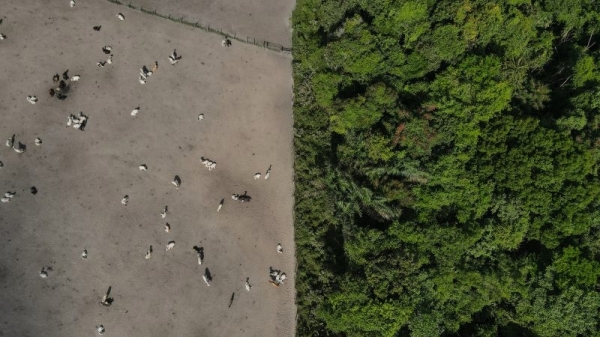Agriculture ministers push to weaken anti-deforestation rules for EU farmers

Austria and six other EU member states are seeking to delay the implementation of a new anti-deforestation law within the bloc, and exempt small-scale farmers from the rules, according to a note circulated among member states, seen by Euractiv, ahead of a meeting of the bloc’s farming ministers on Tuesday (26 March).
“The implementation of the EUDR will—against its original intention—negatively affect sustainable and small-scale agricultural and forestry practices in the European Union, while third countries are only banned from importing into the EU,” reads the text.
The efforts, spearheaded by Austria and endorsed by Finland, Italy, Poland, Slovakia, Slovenia, and Sweden, aim to weaken the implementation of the EU anti-deforestation regulation (EUDR) and loosen requirements for EU member states.
The EUDR extends to cattle, cocoa, coffee, palm oil, soya, wood, and many derived products, such as chocolate and leather, produced outside and inside the EU.
Companies seeking to place their products on the bloc’s market must demonstrate that these do not come from deforested or degraded land after December 2020, a measure that will become mandatory for small-scale farmers by 30 June 2025.

EU environment chief to address anti-deforestation law concerns on South America tour
The EU’s Environment Commissioner Virginijus Sinkevičius is touring Paraguay, Bolivia, and Ecuador this week to address concerns related to the implementation of the world’s first ban on deforestation-linked products, a measure criticised as protectionist by some of the bloc’s trade partners.
The Austrian delegation argues that the new obligations will place a “disproportionate administrative burden” on the European agricultural sector.
It also cautions that the rules could hamper the development of the EU’s organic sector, particularly impacting conventional cattle farms that want to go organic, as they would require larger grazing areas.
“Such areas falling under the EUDR-forest definition will trigger associated restrictions and impede sustainable (alpine) pasture management promoting biodiversity and animal welfare,” adds the note.
Additionally, the seven-country coalition warned of a “drastic reduction” in the production of protein crops due to the bureaucracy created by the new rules, particularly for soybeans, stressing that it could lead to more imports from outside the EU.
“The requirements contradict the envisaged EU protein initiative to strengthen the cultivation of protein crops, especially soy,” says the text.
To tackle these challenges member states are demanding to “significantly” extend the period for implementing the measures, and exempt EU small farms from the new due diligence rules, and producers in countries where the risk of deforestation is low.
“Given the current efforts to reduce bureaucratic burdens across EU legislation, it is important to re-evaluate the existing certification systems and simplify as much as possible,” it states.
Not an ‘official’ position
But the move to dilute the implementation of the EUDRs, led by Austria’s agriculture ministry, has been opposed by the country’s Minister for Environment, Leonore Gewessler.
In a letter addressed to EU Environment Commissioner Virginijus Sinkevičius obtained by Euractiv, Gewessler declared that the note “does not constitute an official Austrian position,” since the environment ministry was not involved in its preparation.
“We urge you to stay on course and not to consider any targeted revisions to the agreed system,” wrote Gewessler.
She noted that deforestation and the loss of carbon storage also impact Austria and its alpine region, with agriculture becoming one of the most negatively affected sectors by these challenges.
“Therefore, the regulation also plays an important role in contributing to climate protection,” she added.
Organic sector slams move
The Austrian note has also been slammed by Eric Gall, deputy director at IFOAM Organics Europe, which defends the interests of the organic sector in Europe, who told Euractiv that none of its member organisations had brought up the concerns raised in the document.
“Authorities are using organic farming as an excuse to weaken environmental legislation (…) the arguments don’t really make sense,” he stressed.
Gail explained, that organic livestock farming should not be affected by the anti-deforestation law, since the herd size should be in line with the land’s capacity.
“We all know that we need to reduce, to a certain extent, production and consumption of animal products as well, so, basically, this argument doesn’t make sense,” said Gail.
Similarly, Nicole Polsterer, a campaigner at FERN, an NGO advocating for forests and the rights of forest peoples in the EU, underscored that any change to the already approved rules would undermine the “breakthrough” legislation.
“The message to the rest of the world will be clear: Europe is happy to take decisive action to end the destruction of forests abroad but isn’t prepared to do so at home,” said Polsterer.
Read more with Euractiv




